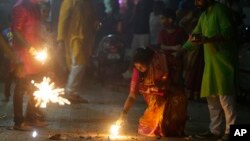Diwali, a major Hindu festival for more than a billion Indians, includes lighting oil lamps or candles to symbolize a victory of knowledge over ignorance, light over darkness and good over evil. People visit friends' homes and exchange gifts.
The festival marks the return of deities Rama and Sita in the epic Ramayana to the northern Indian town of Ayodhya after 14 years of exile.
Firecrackers are in huge demand across the country as the evening sky is lit up by the festivities.
But use of firecrackers is being discouraged by both the government and environmentalists as air pollution levels across New Delhi and other major cities reach up to eight times what India deems acceptable and 20 times what's recommended by the World Health Organization.
Worried especially by the impact on the health of children, the Supreme Court this year banned the sale of firecrackers in the capital and neighboring areas to prevent a toxic haze after the Diwali nights that has residents hiding indoors.
Children are more vulnerable to developing lung ailments including asthma and bronchitis, as well as damage to their nervous systems.




